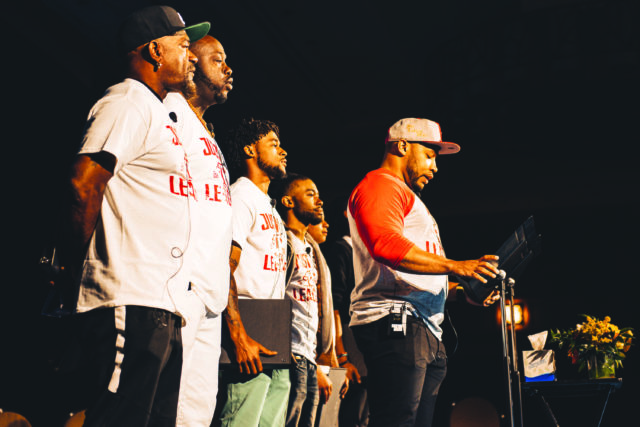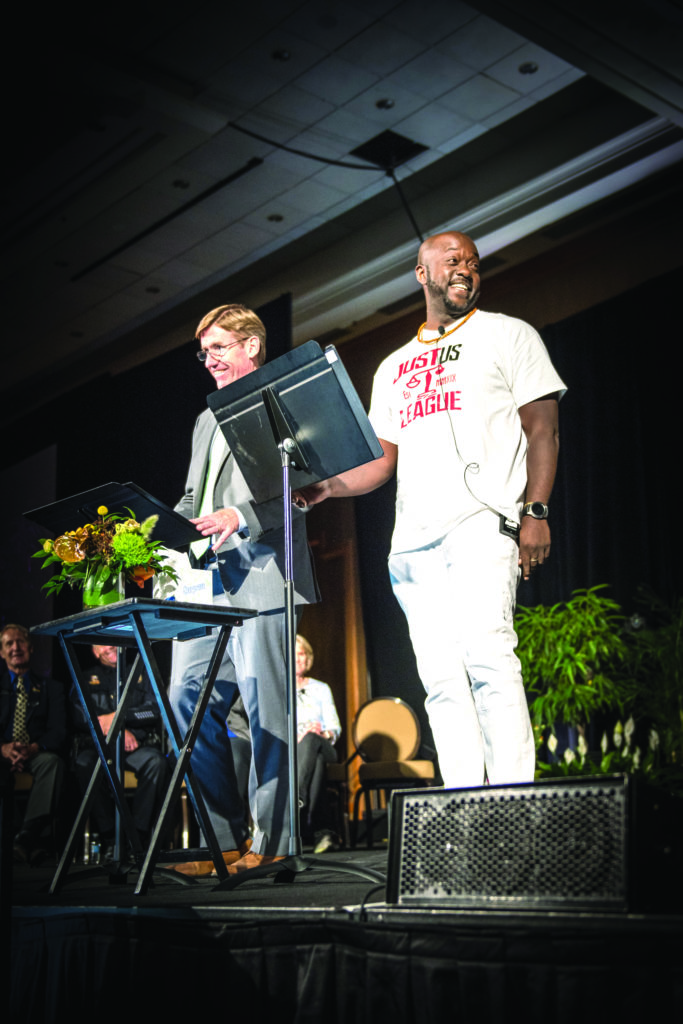
“If you drop an oak tree seed into a concrete world, there’s life inside of that seed. It’s vibrant but it’s not growing, it’s just there dormant,” performer Daniel Guillory muses from the stage. “If you take this exact same seed and drop it in a decent place where there are nutrients, sun, earth and water … this thing will branch out and start growing and produce fruit.”
Guillory joins six other formerly incarcerated people to share their stories as part of Motus Theater’s newest project, JustUs: Stories From the Frontlines of the Criminal Justice System. Brandon Wainwright lost a full-ride scholarship to college after, homeless and desperate, he was charged with robbery. Cierra Brock spent time in jail after unknowingly taking over someone else’s slot machine at a casino (a crime in Colorado). Brian Lynch was arrested during a traffic stop for speeding, while officers filmed the whole thing, “like we were some trophy animals he caught,” he says in his monologue.
With performers from Texas, New York and Colorado Springs, the stories presented are complex and nuanced. Too often, society tends to generalize and oversimplify the issues in its attempts to understand and develop sweeping policy decisions.
“This whole problem is not one-dimensional,” says performer Juaquin Mobley. “There are so many different facets to it. We’re just trying to dig out some of these layers.”
The idea behind the JustUs monologues has been in the works for some time, says Motus’ Artistic Director Kirsten Wilson, a continuation of the organization’s mission to amplify the voices of marginalized groups and create dialogue around critical issues. But since the 2016 election, and “the escalation of dangerous rhetoric focused at the undocumented community,” she says, Motus has remained focused on its UndocuAmerica project, bringing the stories of young undocumented people to the national stage through performances and a podcast.
Then last year, the National Association for Community and Restorative Justice commissioned the JustUs monologues ahead of its annual conference, where Motus performed in front of 1,600 people. As with the UndocuAmerica monologues, law enforcement officers, including Boulder County District Attorney Michael Dougherty, read alongside the performers, adding weight to their stories and a sense of collaboration rarely seen in public.

“We want to talk to the DAs and the cops so that they can understand how to separate the two. At the end of the day, they see us for whatever they arrested us for. But they don’t know what led up to it. They don’t know what we are going through. And they don’t know the culture and the communities that we come from,” Mobley says. “By them getting to sit down and talk with us and converse with us, I think they could start getting some understanding and start trying to figure out how to attack mass incarceration.”
JustUs is not to be confused with justice, Mobley says, from the stage. Too often it feels like “just us,” he says, as justice is an elusive concept for many in the criminal justice system.
The son of a Dominican immigrant and an African-American mother from Kansas City, Mobley grew up between Colorado Springs and New York City in what he calls “for lack of a better term, a blue collar, hardworking” environment. But the neighborhoods in which he lived exposed him to a different way of life.
“I was, I guess, seesawing between the streets and school,” he says. “As you know, you can’t really do nothing lukewarm, you gotta be committed one way or the other.”
He graduated high school and started college, but after losing most of his savings in a bad investment, Mobley was involved in an armed robbery on a visit to Colorado, sentenced to twice the time in prison two white men who committed the same crime received.
“My intention was to just get a couple dollars so I could go back to New York and pay my bills,” he says. “I was just like, I can just run into the streets, grab this money and get right back on my feet. The universe had different plans and as a result I was sentenced to 15 years in the DOC (Department of Corrections).”
He didn’t act alone and most of his friends who were involved came from similar backgrounds and faced similar sentences. One friend had even recently graduated with a double bachelor’s degree, but struggled to find a job before they were arrested.
As Mobley explains in his monologue, research from the Brookings Institute shows that a white man who checks the felony box on a job application is more likely to get called back than a black man with no criminal record.
The JustUs monologues are a mixture of personal experience and research, drawing from some of the most alarming statistics about our criminal justice system and exposing the systemic racism that underlies it.
“The system doesn’t make sense and we don’t understand it,” Astro Allison says in his monologue. “And if you think about it, outside of a lens of racist justification that says it’s normal for one out of three black men to end up going to prison, then you won’t understand it either.”

Allison, whose monologue focuses around the concept of family, from his mother who raised him as a single parent, to his cousin that he was charged with, says there’s no better time to be talking about these issues.
“It’s a nice mesh of storyteller and then fact-speaking, at the same time: just getting out the whole truth,” Allison says.
There are many misperceptions about the criminal justice system the performance seeks to expose. As many performers are quick to point out, the term “rehabilitation,” although often used, is rarely experienced.
“I think some misperceptions about the criminal justice system is that it’s corrective. It’s actually the antithesis of that,” Mobley says. “A lot of my friends that were incarcerated, I’m willing to say 90% of them returned with worse charges.”
Like a career network built from college friends and connections, prison, Mobley says, exposes people to a network of criminals.
“You learn to become more criminal because you’re like, OK, this person over here is a con artist. This guy is a safe tapper. You can just put them all together. That’s the state of mind that’s in there.”
According to Boulder DA Dougherty, Colorado rehabilitation rates are some of the worst in the nation, with 50% of people who leave state prison returning within three years.
“So if 10 guys walked out this morning, five are going back in three years,” he says. “That’s a failure rate that we would not accept in any other business, school or industry, and as long as we continue to accept it from our correctional system, we’re going to continue to fail the offenders, the victims and the taxpayers.”
As Allison explains: Each year, Colorado spends $7,000 per public school student and $39,000 for each inmate.

“What we need to find out is what is creating the mindset of thinking prison is the first option; it needs to be the last option,” says performer Dereck Bell, whose monologue Dougherty read during last year’s restorative justice conference. “It’s a work in progress but I think educating the community and coming up with programs [can] help avoid the percentages of recidivism to help people not go back and to help people not go at all.”
Bell shares the story of his 2007 arrest in Colorado Springs, a product of “just having somebody’s back… and then them turning around and having their back turned on you.” He was sentenced to a decade in federal prison for a non-violent drug offense, put into an environment where he ended up stabbing someone in the neck out of self defense.
“They know what’s going to happen in there, they know what’s going to happen,” he says in his monologue. “The criminal justice system took my innocence away.”
“I’ll be the first to recognize that the justice system needs to be improved upon,” Dougherty says. “And I think having people who are in a place in their lives where they’re willing to share those incredibly powerful stories is exactly the kind of inspiration we need to continue through what at times can be a painful, difficult struggle of reform.”
“It’s given me a voice because it’s coming to a different crowd,” Bell adds. “It’s given me the ability to have people comfortable enough to say, OK, this guy’s not really a bad person at all.”
The process of working with Motus on the monologues was cathartic for the performers, Mobley says. Not only was it a way to express what he and the other presenters had experienced both in and leading up to their involvement with the criminal justice system, but it also helped provide context for the pain and trauma many of them have gone through in their lives.
“The fact is, all of us up here are human beings who have committed crimes, but that is not our truth,” Guillory continues in his monologue. “We are not ontologically criminals, that is not our essence. And instead of helping us return to the full truths of who we are, the criminal justice system takes away our names and gives us DOC numbers. They take away our dignity and our freedom and our happiness. And most of all they take our potential away from being our very best selves.”
ON THE BILL: JustUs: Stories From the Frontlines of the Criminal Justice System. 6:30 p.m. Monday, Jan. 20. Dairy Arts Center, 2590 Walnut St., Boulder. Family friendly showing at 4:30 p.m. Tickets are $20.














